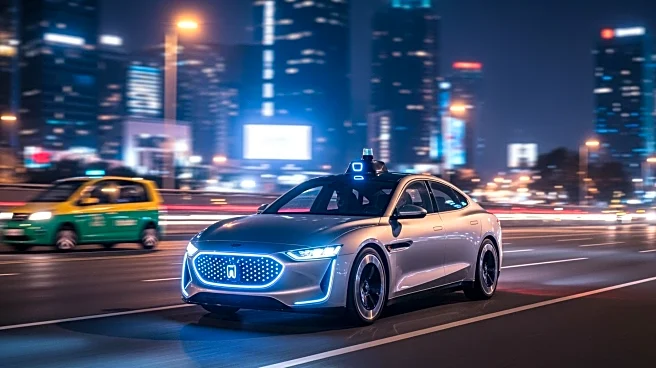What's Happening?
Waymo LLC, a subsidiary of Alphabet Inc., is expanding its self-driving car services across major U.S. cities, including Los Angeles, Phoenix, and San Francisco, with plans to extend to Dallas, Denver,
Miami, Nashville, and Washington, DC by 2026. The company currently operates over 2,000 electric vehicles and provides more than 250,000 trips weekly. Waymo's autonomous vehicles are equipped with advanced AI systems, LiDAR, radar, and cameras, offering a new commuting solution that could potentially replace traditional ride-sharing platforms like Uber. Despite some logistical challenges, Waymo reports high user satisfaction and aims to alleviate common commuting issues such as parking and traffic congestion.
Why It's Important?
The expansion of Waymo's self-driving services represents a significant shift in urban transportation, potentially reducing reliance on human-driven ride-sharing services. This development could lead to decreased traffic accidents, road rage, and noise pollution, while increasing parking availability. The technology promises enhanced safety by eliminating human errors, which are responsible for the majority of traffic accidents. As Waymo and other companies continue to develop autonomous vehicles, the transportation industry may see a transformation in commuting habits, impacting ride-sharing companies and urban infrastructure.
What's Next?
Waymo plans to further expand its range and incorporate highways and interstates into its service areas. As the technology develops, improvements in navigation systems and charging infrastructure are expected. Regulatory adaptations, such as new traffic laws for autonomous vehicles, will be necessary to accommodate this shift. Other companies like Zoox, Pony Ai, and WeRide are also working to expand self-driving technology, indicating a growing market for autonomous vehicles.
Beyond the Headlines
The rise of self-driving cars raises ethical and safety concerns, including potential hacking vulnerabilities and the impact on employment in the ride-sharing industry. The technology also challenges cultural norms around driving and personal mobility, potentially altering the traditional car-centric culture in the U.S.










